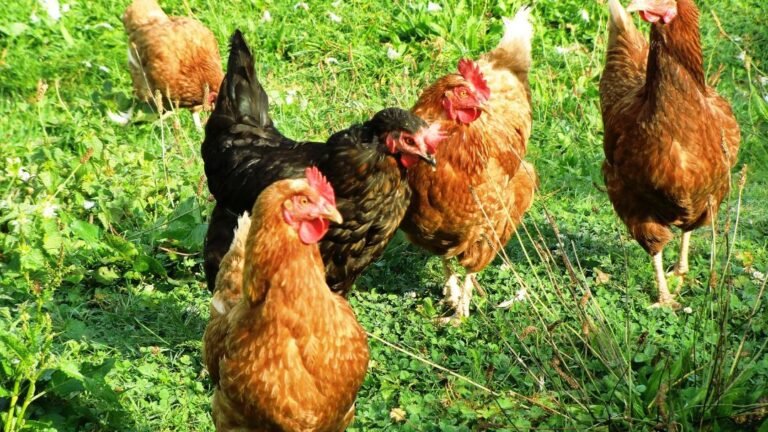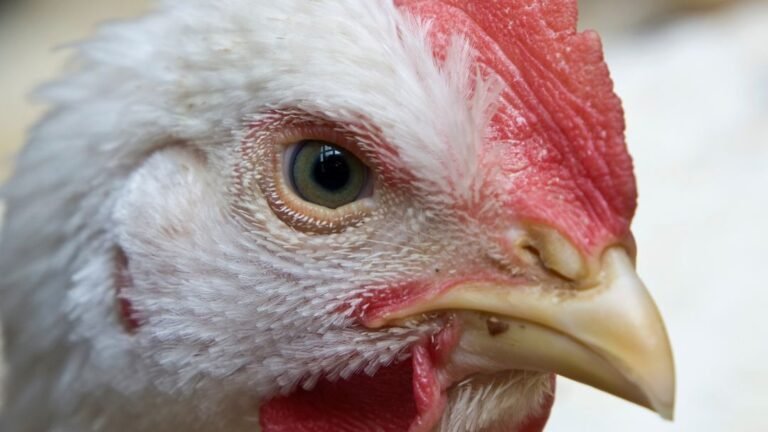Yes, chickens can eat ticks, which can help control tick populations and reduce health risks associated with ticks. Ticks can carry diseases such as Lyme disease, so having chickens eat ticks can be beneficial in reducing the risk of these diseases.
Chickens are natural foragers and can consume ticks along with other insects and pests. By doing so, they help keep the tick population in check and contribute to a healthier environment.
The Basics Of Tick Control
When it comes to raising chickens, tick control is an important aspect of overall health management. Ticks are not only a nuisance to humans and animals, but they can also carry diseases that pose a serious threat. In this blog post, we will explore the basics of tick control for chickens, including key factors to consider and traditional methods for tick control.
Key Factors To Consider In Tick Control Efforts
When implementing tick control measures for your chickens, it is crucial to consider the following key factors:
- Environment: Assess the environment in which your chickens reside. Ticks prefer areas with tall grass, shrubs, and dense vegetation. By keeping the surroundings clean and maintaining a well-manicured area, you can help minimize the tick population.
- Preventive Measures: Employ preventive measures to reduce the risk of tick infestations. Regularly inspect your chickens for ticks and promptly remove them. Implement appropriate fencing to prevent wild animals, which can carry ticks, from entering the chicken coop.
- Chicken Breed: Consider the breed of your chickens. Some breeds are more susceptible to tick infestations than others. Opt for chicken breeds that are known to be more resistant to ticks.
- Integrating Natural Predators: Integrate natural predators into your tick control efforts. Animals such as guinea fowl and wild birds are known to feed on ticks. By having them around, you can help control the tick population naturally.
Traditional Methods For Tick Control And Their Limitations
In addition to the above key factors, various traditional methods can be employed for tick control in chickens. Here are some commonly used methods along with their limitations:
| Traditional Methods | Limitations |
|---|---|
| Chemical Treatments | Chemical treatments can be effective in killing ticks, but they may pose health risks to chickens if not used correctly. Careful consideration should be given when using chemicals near the flock. |
| Dust Baths | Chickens naturally take dust baths to rid themselves of pests, including ticks. However, dust baths alone may not provide complete tick control and should be supplemented with other preventive measures. |
| Herbal Remedies | Some herbal remedies, such as neem oil or diatomaceous earth, can help repel ticks. However, their effectiveness may vary, and they should be used as part of a comprehensive tick control plan. |
While traditional methods can provide some level of tick control, it is essential to recognize their limitations and integrate them with preventive measures to achieve the best results. By understanding the basics of tick control and implementing suitable methods, you can help protect your chickens from ticks and the potential health risks they pose.
The Role Of Chickens In Tick Control
Understanding The Natural Behaviors Of Chickens
Before delving into the specific role of chickens in tick control, it is important to understand their natural behaviors. Chickens are omnivorous birds by nature, meaning they have the tendency to eat both plants and small organisms such as insects and ticks. They possess an insatiable curiosity and peck instinctively at anything that catches their attention.
Do Chickens Feed On Ticks?
Yes, indeed! Chickens have a natural affinity for ticks and other pesky insects that may lurk in their environment. These tiny arachnids become an irresistible snack for chickens as they move through grassy areas or attach themselves to animals. Ticks are often found in areas known for tall grass, shrubs, and forests, making them a prime target for chickens that are free-ranging or enjoying outdoor space.
Benefits Of Using Chickens For Tick Control
When it comes to tick control, chickens play a crucial role that goes beyond their dietary preference. Here are some of the benefits of utilizing chickens for those concerned about tick-borne diseases:
- Effective natural defense: Chickens have an innate ability to minimize the presence of ticks in an area. Their constant grazing and pecking habits help to keep tick populations in check by devouring these unwanted pests.
- Eco-friendly solution: Unlike chemical treatments or pesticides, relying on chickens for tick control is an environmentally-friendly alternative. Chickens do not leave behind harmful residues, making them a safe choice for both humans and the natural surroundings.
- Cost-effective option: One significant advantage of using chickens is the cost-effectiveness of their services. Once a flock of chickens is established, they require minimal maintenance and can sustain themselves with insects and foraged plants, significantly lowering your expenses in tick prevention.
- Added benefits: Aside from their tick-controlling capabilities, chickens offer additional advantages. They produce nutrient-rich manure that can enhance soil for gardening purposes, and their presence can also deter other pests.
In conclusion, chickens serve as invaluable allies in the battle against ticks. Their natural instincts, combined with their eco-friendly and cost-effective qualities, make them an ideal choice for those seeking a sustainable solution to tick control. By allowing chickens to roam and explore areas where ticks may be abundant, you not only create a healthier environment but also enjoy the benefits of their presence as they rhythmically peck away at these unwanted insects.
Evaluating The Effectiveness Of Chickens In Tick Control
Ticks are pesky parasites that can not only cause discomfort but also pose health risks to humans and animals. To combat these blood-sucking insects, a natural solution that has gained popularity is introducing chickens into tick-infested areas. But how effective are chickens in tick control? Let’s explore the research studies conducted on the impact of chickens on tick populations and the factors that influence their effectiveness.
Research Studies On The Impact Of Chickens On Tick Populations
Several scientific studies have examined the impact of chickens on tick populations and the results have been promising. Researchers have found that chickens can significantly reduce tick numbers in certain conditions. For example, a study published in the Journal of Medical Entomology found that free-roaming chickens reduced the abundance of ticks in their environment by an impressive 86%. These findings suggest that chickens can be an effective natural method of controlling tick populations.
Factors That Influence The Effectiveness Of Chickens In Tick Control
1. Chicken Breed:
The breed of the chicken can affect their ability to control ticks. Certain chicken breeds, such as Guinea fowl, have shown to be more efficient in tick removal compared to others. Guinea fowl are known for their foraging habits and are natural tick predators, making them a popular choice for tick control. However, other chicken breeds may also contribute to tick reduction, although to a lesser extent.
2. Density of Chickens:
The number of chickens in an area can also impact their effectiveness in tick control. Research suggests that a higher density of chickens leads to greater tick reduction. A study published in PLOS ONE demonstrated that increasing the number of chickens in an area resulted in a proportional decrease in the number of ticks found. Therefore, introducing an adequate number of chickens can enhance their effectiveness in controlling tick populations.
3. Habitat and Environmental Factors:
The habitat in which chickens are kept plays a crucial role in their ability to control ticks. Chickens thrive in diverse environments with access to vegetation. Such environments provide them with opportunities to forage and hunt ticks effectively. Additionally, the climate and presence of other animals can influence tick populations. Therefore, it is important to consider these environmental factors when evaluating the effectiveness of chickens in tick control.
4. Tick Species:
The effectiveness of chickens in controlling ticks may differ depending on the tick species present. While chickens are generally efficient at consuming and eliminating various tick species, some ticks might be more resilient to chicken predation. It is essential to consider the specific tick species in the area to determine the potential impact of chickens on tick control.
By carefully considering these factors, including chicken breed, density, habitat, environmental conditions, and tick species, we can maximize the effectiveness of chickens in reducing tick populations. Introducing chickens into tick-infested areas can provide a natural and eco-friendly solution to combat these disease-carrying parasites while creating a harmonious environment where animals can help control pests naturally.
Health Risks Associated With Chickens As Tick Control
In the ongoing battle against ticks and the diseases they carry, many people have turned to chickens as a natural method of tick control. These feathered creatures are known to gobble up ticks with fervor, reducing the chances of human and animal exposure. However, the role of chickens in tick control comes with certain health risks that should not be overlooked. In this article, we will explore the potential risks to chickens from tick infestations, zoonotic diseases associated with ticks and chickens, and the proper safety precautions for both chickens and humans.Potential Risks To Chickens From Tick Infestations
While chickens are natural tick predators, they are not completely immune to the dangers ticks pose. Tick infestations on chickens can lead to several health issues, including:1. Anemia: A heavy tick burden can cause excessive blood loss, leading to anemia in chickens. Anemic chickens may exhibit weakness, pale combs, and a reduced ability to lay eggs. Regular tick checks and prompt removal can help prevent anemia.2. Disease transmission: Ticks are carriers of various pathogens that can cause diseases in chickens. When a tick bites a chicken, it can transmit tick-borne illnesses such as avian spirochetosis, Lyme disease, and tick paralysis. These diseases can have serious consequences for the overall health and productivity of the flock.3. Skin irritation and wounds: Tick bites can cause skin irritation and discomfort in chickens. In severe cases, excessive scratching or pecking at the affected area can lead to open wounds, which may become susceptible to secondary infections.It is crucial for chicken owners to be vigilant about tick control and ensure their flock’s well-being by regularly inspecting them for ticks and implementing appropriate preventive measures.Zoonotic Diseases Associated With Ticks And Chickens
Ticks are not only a concern for chickens but also for humans. They can transmit zoonotic diseases, which are illnesses that can be transmitted between animals and humans. Some of the zoonotic diseases associated with ticks and chickens include:1. Lyme disease: Caused by the bacterium Borrelia burgdorferi, Lyme disease can have debilitating effects on humans. While chickens themselves cannot contract Lyme disease, the ticks they carry on their feathers can transmit the infection to humans if not handled with care.2. Tick-borne encephalitis: This viral infection affects the central nervous system. Although chicken to human transmission of tick-borne encephalitis is rare, it is important to take precautions to minimize exposure to ticks and potential transmission of the virus.To protect both chickens and humans from zoonotic diseases, it is essential to practice proper tick control techniques, use protective clothing when handling chickens, and employ effective personal protective measures.Proper Safety Precautions For Both Chickens And Humans
To minimize the health risks associated with chickens as tick control, it is important to follow these safety precautions:1. Regular tick inspections: Conduct regular tick inspections on chickens to identify and remove ticks promptly. Pay close attention to areas where ticks are likely to latch onto chickens, such as under the wings, around the vent, and on the head.2. Tick prevention measures: Implement tick prevention measures, such as keeping the chicken coop area well-maintained with trimmed grass, minimizing tall vegetation where ticks thrive, and using appropriate tick control products for chickens.3. Protective clothing: When handling chickens or working in tick-infested areas, wear protective clothing like gloves, long-sleeved shirts, and pants tucked into socks. This reduces the risk of tick bites and potential disease transmission.4. Personal protective measures: After handling chickens or being in tick-prone areas, thoroughly check your body for ticks and remove them promptly. This helps prevent tick-borne diseases in humans.By adhering to these safety precautions, chicken owners can mitigate the health risks associated with tick infestations and ensure the well-being of both their feathered friends and themselves.– – –The health risks associated with chickens as tick control should not be underestimated. While chickens can be effective natural tick predators, tick infestations can still pose risks to their health. Additionally, ticks can transmit zoonotic diseases to both chickens and humans. Taking proper safety precautions, such as regular tick inspections, tick prevention measures, and protective clothing, is essential to minimize these risks. Stay informed and proactive in order to reap the benefits of chickens as tick control while ensuring the safety and health of all parties involved.Implementing Chickens As Tick Control In Your Environment
Implementing Chickens as Tick Control in Your EnvironmentTicks can be a nuisance and a health risk in many outdoor environments. These tiny blood-sucking parasites can transmit diseases such as Lyme disease, Rocky Mountain spotted fever, and tick-borne encephalitis. To combat the growing tick problem, more and more people are turning to a natural and effective solution – chickens. Yes, you read it right – chickens can play a vital role in keeping your environment tick-free. In this blog post, we will explore the different aspects of implementing chickens as tick control in your environment. From the best chicken breeds for tick control to feeding and management considerations, we’ve got you covered. Let’s dive in and explore the fascinating world of using chickens as a tick control strategy.Best Chicken Breeds For Tick Control |
|---|
If you’re planning to use chickens as a natural tick control method, it’s important to choose the right chicken breed for the job. Not all chickens are created equal when it comes to tick hunting abilities. Some breeds are more effective at tick control than others.
|
Feeding And Management Considerations For Using Chickens As Tick Control
Implementing chickens as tick control requires proper feeding and management to ensure their effectiveness. Here are some considerations to keep in mind:
- Provide a balanced diet: While chickens have a natural inclination to hunt and consume ticks, it’s important to provide them with a balanced diet to keep them healthy and active in their tick control duties.
- Access to fresh water: Chickens need access to fresh water at all times. Hydration is crucial for their overall well-being and tick hunting capabilities.
- Security and shelter: Ensure your chickens have a safe and secure coop to protect them from predators and inclement weather. A stressed or injured chicken won’t be able to effectively hunt ticks.
- Regular health checks: Regularly monitor the health of your chickens to address any potential issues promptly. A sick chicken will be less effective in controlling tick populations.
- Provide suitable foraging areas: Allow your chickens to forage in areas with high tick activity. By providing them access to tick-infested areas, you enhance their ability to control the tick population.
Integrating Chickens Into Your Overall Tick Control Strategy
To make the most out of using chickens as tick control, it’s essential to integrate them into your overall tick control strategy. Here are a few tips to help you maximize their effectiveness:
- A combination approach: While chickens are incredible tick hunters, they should be considered as part of a holistic approach to tick control. Implementing other methods such as landscaping modifications, tick repellents, and regular tick checks on humans and pets can enhance the effectiveness of your tick control efforts.
- Proper fencing: Ensure your chicken coop is fence properly to prevent chickens from wandering off and encountering potential dangers. A well-designed fence also keeps out other animals that can disturb or harm the chickens.
- Rotational grazing: Consider rotating your chickens in different areas to maximize their impact on tick populations. This allows them to target different tick-infested areas within your environment.
- Observation and adjustment: Regularly observe your chickens’ behavior and adjust their environment if needed. Pay attention to their tick hunting abilities and make any necessary changes to optimize their effectiveness.
Conclusion
When considering the health risks associated with ticks, it’s essential to explore the natural solutions available, and chickens are known to be effective tick predators. Their tendency to peck at parasites makes them a valuable asset for tick control. However, it’s important to remember that chickens can also carry diseases such as Salmonella, so proper care and hygiene are crucial.
Overall, allowing chickens to eat ticks can be a beneficial strategy, but precautions must be taken to ensure the safety of both the chickens and humans.




